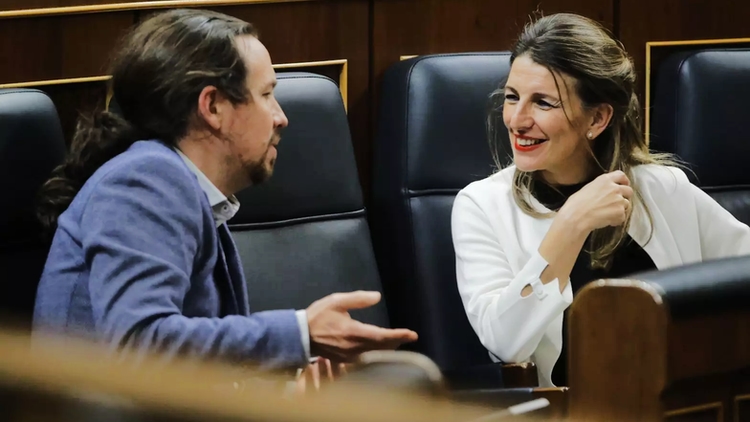Ángel Collado
Pedro Sánchez’s coalition government, with the PSOE and Podemos sharing out independent quotas of ministers and political areas, has entered into a double internal crisis with the handling of the so-called “yes is yes” law, or sexual freedom law, by the Minister for Equality, Irene Montero.
In addition to the usual differences between Sanchez and the communists, there is the clash between the cliques of the far left: the sector that follows the orders of Pablo Iglesias and the one that is formed around the aspirations of the vice-president of the Executive Yolanda Díaz.
Sánchez arrived at the Executive with a particular regime of sharing responsibilities between populist partners within the cabinet and of cessions to his external pro-independence allies, unprecedented in Spanish democracy. Within the government, the five members of Podemos and its various brands, with the legion of senior officials in the respective departments, were chosen by Pablo Iglesias.
The founder of Podemos removes and places ministers within his quota: from the partner and mother of his children, Irene Montero, to the current holder of the Labour portfolio with the rank of vice-president that she enjoys inherited from Iglesias himself. This quota system was the key to the populist left voting for Sánchez’s investiture as prime minister.
The support of the pro-independence parties is based in turn on the concessions programmed throughout the legislature: first the pardons for the main leaders of the secessionist attempt in Catalonia on 1 October 2017 with Oriol Junqueras at the head, now the liquidation of the crime of sedition for the benefit of all the coup perpetrators and later the reduction of the crime of embezzlement to make them happy.
Within the PSOE, the political bills paid to the Catalan separatists are bothering the regional socialist leaders, especially those who will go to the polls in the regional elections next May. They fear they will be the first to pay the price for the brand’s erosion, especially now that the criminal benefits for the coup perpetrators are being accompanied by reduced sentences for rapists and harassers under the law bearing the surname Montero. A law that was approved by the Council of Ministers presided over by Pedro Sánchez and sanctioned in the Cortes by the majority that they call “of progress” (the left in bloc, independentistas and heirs of the political arm of ETA) plus Ciudadanos.
News of sex offenders benefiting from the reform is trickling out all over Spain. While the ‘Sanchista’ sector of the Government points the finger at Montero for taking on the judges instead of recognising the dramatic error, the official Podemos sector (the follower of Pablo Iglesias) speaks of cowardice for not closing ranks with the Minister of Equality, and Yolanda Díaz, on her own, prefers not to enter the fray.
At the heart of the crisis is the decision Sánchez took in his day to let the podemitas do whatever they wanted in the sphere of his ministries despite the more populist postulates of the purple party. The cession included the banner of feminism, which was handed over to Montero and her team despite the opposition of the PSOE’s most traditional feminists, led by Carmen Calvo.
Calvo and the Minister of Justice, Juan Carlos Campo, stood out in their criticism of the first plans for the “yes is yes” law, in the case of the latter because of the already obvious legal botchedness of the reform. Both were left out of the government and the Minister for Equality achieved all her goals.
But Sánchez’s interest in leaving areas of protagonism in power to the party founded by Iglesias is also a personal investment, as he recognises that he is counting on the far left for the future. The problem for the head of the executive is that he wants to tutor this other part of his coalition without counting on the Iglesias clan. He has said in public that he aspires to reach a pact after the next elections with what he calls “Yolanda Díaz’s space”, not Podemos.
The crisis over the law that was going to protect women and turns out to ease the sentences for rapists also reveals all the internal contradictions in the coalition cabinet and Sánchez’s complicated game of personal interests vis-à-vis the PSOE.
The chief of the Executive, for his own weakness and in order to remain in office now and later, is betting on playing into the hands of the extreme left. The party’s barons in Castilla-La Mancha, Extremadura and Aragón, with clear majorities or aspirations to achieve them on their own, are refusing to accept their party’s mortgages with Podemos and the pro-independence supporters who threaten to leave them in the opposition from May next year. Sánchez will then have six months to prepare for the campaign from the Moncloa Palace.






